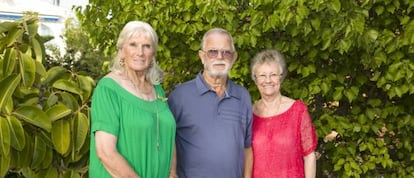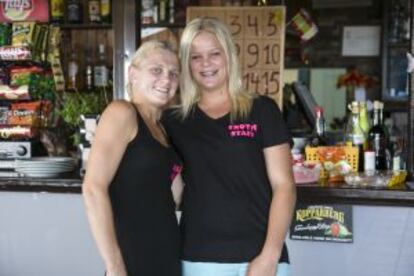Bye bye España
Unemployment, taxes and old age are forcing thousands of Europeans to sell up and leave Spain

In the sunny cafés of Calpe, a seaside town in Alicante province, there is one prevailing topic of concern among the white-haired, suntanned British retirees: the Spanish Tax Agency.
The mistrust triggered by the new obligation to declare assets located abroad is just one of the reasons pushing hundreds of thousands of elderly Europeans to drop off the official statistics, and in many cases, bid Spain farewell forever.
The lack of opportunities for young people, the cost of living and statistical engineering on the municipal rolls all go some way toward explaining a population drop that is causing lost sleep for many coastal town authorities. A few Europeans are still being attracted by low house prices, but they are swimming against the tide of expats who are packing up their things and going home.
The municipal register flash figures released by the National Statistics Institute (INE) show that of the more than half-a-million foreigners who left the local “padrón” over the last year, most were EU citizens. Not counting Romanians and Bulgarians, 219,225 EU citizens disappeared from the local rolls in 2013.
Yet new population figures published this week by INE show that only a few tens of thousands of people have actually left the country. The pronounced drop in municipal population records, claim local authorities, is a result of a clean-up effort that has deleted individuals who had given no signs of life in the previous two years from the padrón.

Britons make up the third-largest foreign community in Spain, after Romanians and Moroccans. There are 297,299 of them on the local population registers, representing a 22.8-percent drop from a year earlier. The German community fell by 23.6 percent and the French by 12.7 percent.
“We are very worried about that law,” confesses Vilma Archer, a British 72-year-old who has seen her Costa Blanca-based knitting group dwindle over the years.
The “law” she is referring to is a new obligation to fill out a form (“modelo 720”) declaring one’s assets abroad. The government’s goal is to catch tax dodgers, but many foreigners are wary of making this information available to authorities.
“We brought our money and our pensions over, and the Spanish government has no business butting in,” says Archer, sitting inside the cafeteria of an elegant hotel on the Alicante coast. “In Greece, they took the money out of citizens’ accounts. We’re scared. We know the Spanish government needs money and can take it away from us. Many friends have sold their homes and left. Others took their names off the padrón and are now renting so they won’t have to be registered.”
Years ago, Archer, who recently lost her husband, embarked on a lifestyle – detached house, gardener, pool cleaner, etc. – that she can no longer afford, just like many of her fellow Britons. She worries that her heirs might have to pay taxes in Spain, and that is why she wants to sell her home here.
The bottom line for many young people is that it simply doesn’t pay to stay in Spain
Sitting beside her, Jean Steel, 73, nods. “I want to leave now,” she announces. She arrived here 13 years ago with her husband Gerald. “Back then the exchange rate against the pound was good and we could lead a good life with our pensions. But now gas has gone up and so has electricity. It is hard to live on a state pension.”
Jean and Gerald want to sell their 1,000-square-meter property in the Gran Sol residential estate. They figure that around 40 percent of their neighbors – Germans, Belgians, Swiss, French – have already left.
Carole Saunders, a councilor in Calpe – where 60 percent of residents are non-Spaniards – explains that Spain’s social services are increasingly seeing impoverished elderly Europeans who cannot afford private residences and are being encouraged to move back home.
While affected municipalities play down the alarmist stories published in the British press, they cannot conceal their concern at the drop in the rolls – the padrón helps local authorities figure out what kind of public services the town needs, and also plays a role in determining the state subsidies for which they may be eligible.
Torrevieja, another Alicante coastal town popular with foreigners, has lost 15,000 residents over the last year, according to the preliminary figures. In Calpe the padrón shows 5,000 fewer people, according to figures offered by councilor Saunders. “This represents losses of around €2 million,” she says. Torrevieja, like other towns, is going to launch a campaign encouraging foreigners to register.
Many of these retired Europeans arrived here in the 1990s looking for good weather at a time when their bodies were starting to age. Now they are between 70 and 80 years old, and they worry about growing old far from their families, in a country where they do not really speak the language and have trouble communicating with their nurses.
We knew how to take care of foreign tourists, but we weren’t so good at taking care of their children”
“The doctors treat us well, but there is nobody to help us once we get out of the hospital,” complains Pauline Mary Groser, an organ player in her eighties who is also planning to leave.
The new generations are also participating in this emigration fever. “The crisis has hit young foreigners who cleaned pools or built houses. Now that kind of work no longer exists or else it’s hogged by the Spaniards,” explains Saunders. Also, all kinds of businesses created to cater for a northern European clientèle have gradually lost their customer bases. Around 50 firms have shut down in recent years in Calpe.
The bottom line for many young people is that it simply doesn’t pay to stay in Spain, no matter how many sunny days a year they get. “I want to leave because the situation has never been this bad,” says Kayleigh Smith, a single mother who has held all kinds of jobs on the Costa Blanca. “There aren’t even courses to sign up for," adds Sophie Jones, who works with her at the same cocktail bar.
“We knew how to take care of foreign tourists, but we weren’t so good at taking care of their children,” says Miguel Just, a tax advisor in Calpe.
While lower house prices in vacation areas have encouraged a slight improvement in the sector, Keith Wildman, president of Afpo, a support group for foreign homeowners, does not believe this will reactivate the foreign community. “When prices recover and the exchange rate against the pound improves, new investors will come, but many more will finally sell their homes and leave.”
Tu suscripción se está usando en otro dispositivo
¿Quieres añadir otro usuario a tu suscripción?
Si continúas leyendo en este dispositivo, no se podrá leer en el otro.
FlechaTu suscripción se está usando en otro dispositivo y solo puedes acceder a EL PAÍS desde un dispositivo a la vez.
Si quieres compartir tu cuenta, cambia tu suscripción a la modalidad Premium, así podrás añadir otro usuario. Cada uno accederá con su propia cuenta de email, lo que os permitirá personalizar vuestra experiencia en EL PAÍS.
¿Tienes una suscripción de empresa? Accede aquí para contratar más cuentas.
En el caso de no saber quién está usando tu cuenta, te recomendamos cambiar tu contraseña aquí.
Si decides continuar compartiendo tu cuenta, este mensaje se mostrará en tu dispositivo y en el de la otra persona que está usando tu cuenta de forma indefinida, afectando a tu experiencia de lectura. Puedes consultar aquí los términos y condiciones de la suscripción digital.









































